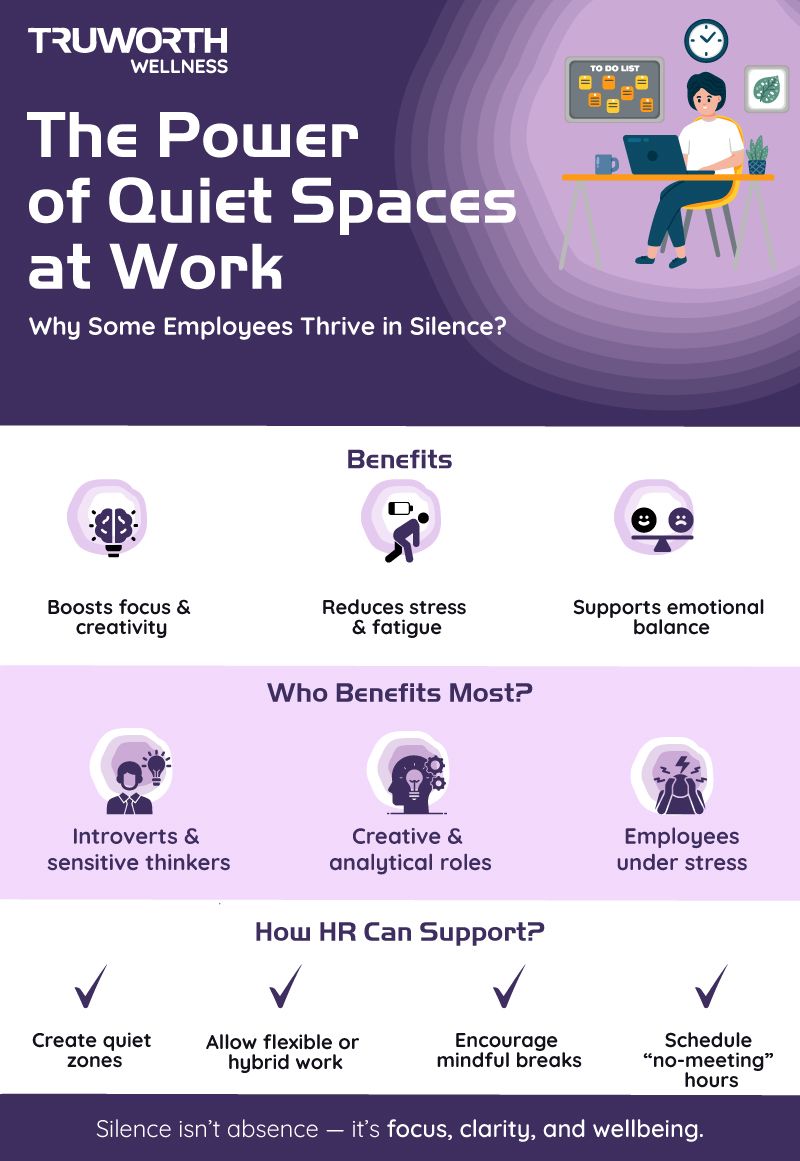The Power Of Quiet Spaces: Why Some Employees Thrive Only In Silence?

Ever noticed how some people slip on their headphones, find a quiet corner, and suddenly their best ideas come to life? While others seem to thrive in open discussions, brainstorming sessions, and constant chatter, there’s a large group of employees who perform best in stillness. Silence isn’t about isolation. It’s about allowing the brain to think, recover, and create. In today’s noisy workplaces, understanding the importance of quiet spaces can transform both employee well-being and productivity.
Must Read: Tips for Employees to Create and Maintain A Healthy Workspace

Why Quiet Spaces Matter?
Modern offices are filled with activity such as ringing phones, video calls, background conversations, and the hum of collaboration. It feels dynamic, but not everyone functions well in such stimulation. For many employees, too much noise can trigger stress, reduce focus, and drain mental energy. Studies from the Journal of Environmental Psychology have shown that constant background noise leads to higher fatigue and lower job satisfaction. Silence, on the other hand, supports focus, creativity, and emotional balance.
The Psychology Behind Silence
1. Attention and Cognitive Load
The human brain can only process a limited amount of information at once. When multiple noises compete for attention, mental overload sets in. Psychologists call this cognitive load. The more distractions, the less energy remains for meaningful work. Employees working in quiet environments show sharper memory, quicker problem-solving, and fewer errors.
Also Read: Polite Ways To Notify A Colleague About Their Distracting Behaviour
2. Flow and Deep Work
Psychologists describe flow as a state of deep immersion where people lose track of time and perform at their best. Flow requires uninterrupted focus. Quiet spaces allow this state to emerge by reducing external noise and mental fragmentation.
3. Personality and Sensitivity
Not everyone is wired the same. Introverts or highly sensitive individuals often experience higher mental fatigue in noisy environments. They recharge in calm settings. Silence helps them process thoughts deeply and deliver high-quality outcomes. Recognizing this personality difference helps managers create inclusive environments where both introverts and extroverts can thrive.
4. Restoration and Creativity
Silence is not empty; it’s restorative. Neuroscience studies reveal that quiet moments allow the brain’s default mode network (responsible for reflection and idea generation) to activate. In short, silence gives the mind the space to connect dots that noise can easily blur.
5. Stress and Emotional Regulation
Noise isn’t just a distraction; it’s a stressor. Chronic exposure to noise increases cortisol levels and heart rate. In contrast, quiet surroundings lower stress, support mindfulness, and create a sense of safety that is essential for workplace wellbeing.
Why Some Employees Need Silence More Than Others?
Some employees appear to require silence to function effectively. Here’s why:
- Personality Traits: Introverts or those with high sensory sensitivity process information more deeply, so external noise can quickly become overwhelming.
- Nature of Work: Roles involving strategy, writing, coding, or design often demand long stretches of focus that only silence can provide.
- Mental Fatigue: After long meetings or constant collaboration, the brain craves recovery time. Quiet moments act as a mental reset.
- Stress and Anxiety: Employees dealing with high stress may find that noise amplifies their anxiety. Silence gives them a sense of control and calm.
- Learned Preference: Individuals who have studied or worked in quieter settings often maintain this preference. Their brains associate silence with productivity.
Common Misconceptions About Silence at Work
1) Quiet employees are disengaged
In reality, they may simply be thinking before speaking or processing ideas internally.
2) Silence means isolation
Not necessarily. Balanced silence allows reflection between interactions, making collaboration more thoughtful.
3) Everyone prefers buzz and noise
People have different cognitive and emotional thresholds. What fuels one employee can drain another.
4) Open offices drive teamwork
While open plans encourage interaction, studies show they can also increase stress and decrease focus if not balanced with private zones.
How Organizations Can Support Quiet-Driven Employees?
| Strategy | Implementation Example | Why It Helps? |
|---|---|---|
| Create Quiet Zones | Designate rooms or pods for silent, focused work | Helps employees engage in deep work and recharge |
| Flexible Work Arrangements | Allow remote or hybrid work for tasks requiring concentration | Respects personal productivity rhythms |
| Noise Control Measures | Add sound-absorbing panels, carpets, and acoustic partitions | Reduces distractions and cognitive strain |
| Defined Collaboration Hours | Encourage “no-meeting hours” or quiet blocks during the day | Prevents burnout and allows mental recovery |
| Awareness Training | Educate managers about personality and sensory differences | Builds empathy and supports inclusion |
| Mindful Break Areas | Create spaces where employees can decompress silently for 5–10 minutes | Encourages micro-recovery and stress relief |
For HR and Wellness Leaders
Understanding the need for quiet spaces isn’t a luxury; it’s a core part of mental health strategy. Employees who thrive in silence are not less social or less committed; they’re simply wired to think deeply, not loudly.When companies respect these differences, they foster an inclusive culture that supports all working styles.
Recognizing and accommodating these differences can transform a workplace culture. By providing options for quiet zones, flexible schedules, or deep-work periods, organisations signal that they value diverse working styles. This isn’t just about comfort. It directly impacts performance, engagement, and retention. Employees feel respected, empowered, and psychologically safe, which enhances overall morale and encourages them to bring their best ideas forward.
Truworth Wellness Takeaway
At Truworth Wellness, we believe well-being begins with understanding, not one-size-fits-all policies. Designing work-spaces and schedules that allow for both collaboration and quiet reflection helps employees bring their best selves to work. Our corporate wellness programs can help you create environments where calm fuels creativity and silence supports success.